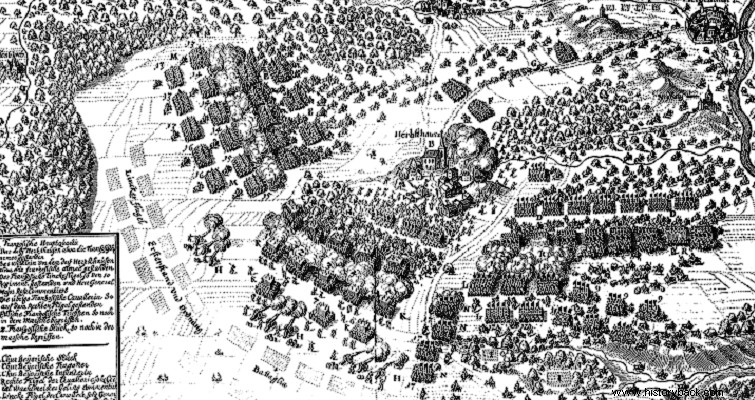
The Battle of Mergenheim on May 2, 1645 was not of decisive importance, it was nothing more than a tactical clash between two small armies, a French one under the famous (later) Field Marshal Turenne and an imperial-Bavarian one under Franz of Lorraine von Mercy. In Mergenheim, however, it proved that even the best can be defeated.
In 1645 the French army invaded Bavaria. The Bavarians had not had time to organize their forces before the French invasion as they had to commit 4,000 troops to their Habsburg allies.
Deep Pursuit
Turenne, having learned of his opponent's difficulties, invaded Bavaria with 11,000 men and 15 cannons and pursued the Bavarians as far as Württemberg where they had taken refuge. He drove Merci and his 6,000 men from there and pursued them as far as Mergenheim in East Franconia. The city was for centuries the seat of the famous Teutonic knights.
Turenne pursued his opponents but due to the fatigue of his men decided to encamp in the area . The French general and later marshal, deployed his men in the surrounding villages to rest as he waited for reinforcements from the allied state of Hesse.
The cessation of the pursuit and the dispersal of the army were serious errors of Touraine's. Apparently he considered the risk of any aggressive return of the Bavarians of the Mersey, whom he pursued for such a distance, as negligible. Perhaps he believed that the long retreat would have negatively affected the morale of the opponents and would certainly have caused them to be as tired as his own troops.
Aggressive return
The German general from Lorraine, however, did not share Touraine's optimism. So he decided to attack. At 02.00 in the morning of May 2, 1645, Turenne woke up learning the news of the aggressive return of the Germans. He immediately ordered his general Rosen to immediately assemble the army at Herbsthausen.
But Rosen was attacked by Mercy's men. Merci found himself in front of Rosen's men, and after a salvo of his nine guns charged with impetuosity against the French. The 3,000 men that Rosen had managed to gather did not manage to contain the Germans who had meanwhile been reinforced and now numbered 9,600 men. Touraine also failed to react. His army was disbanded first the infantry and then the cavalry.
He himself was almost captured and to escape he fled to Hesse Kassel. To deal with the situation the de facto ruler of France, Cardinal Mazarin, sent a new army under the great Comte to western Germany. In August 1645 Comte clashed with the Germans at the Second Battle of Nordlingen in which Mercy was killed fighting. His French opponent erected a monument in his honor on the battlefield.
